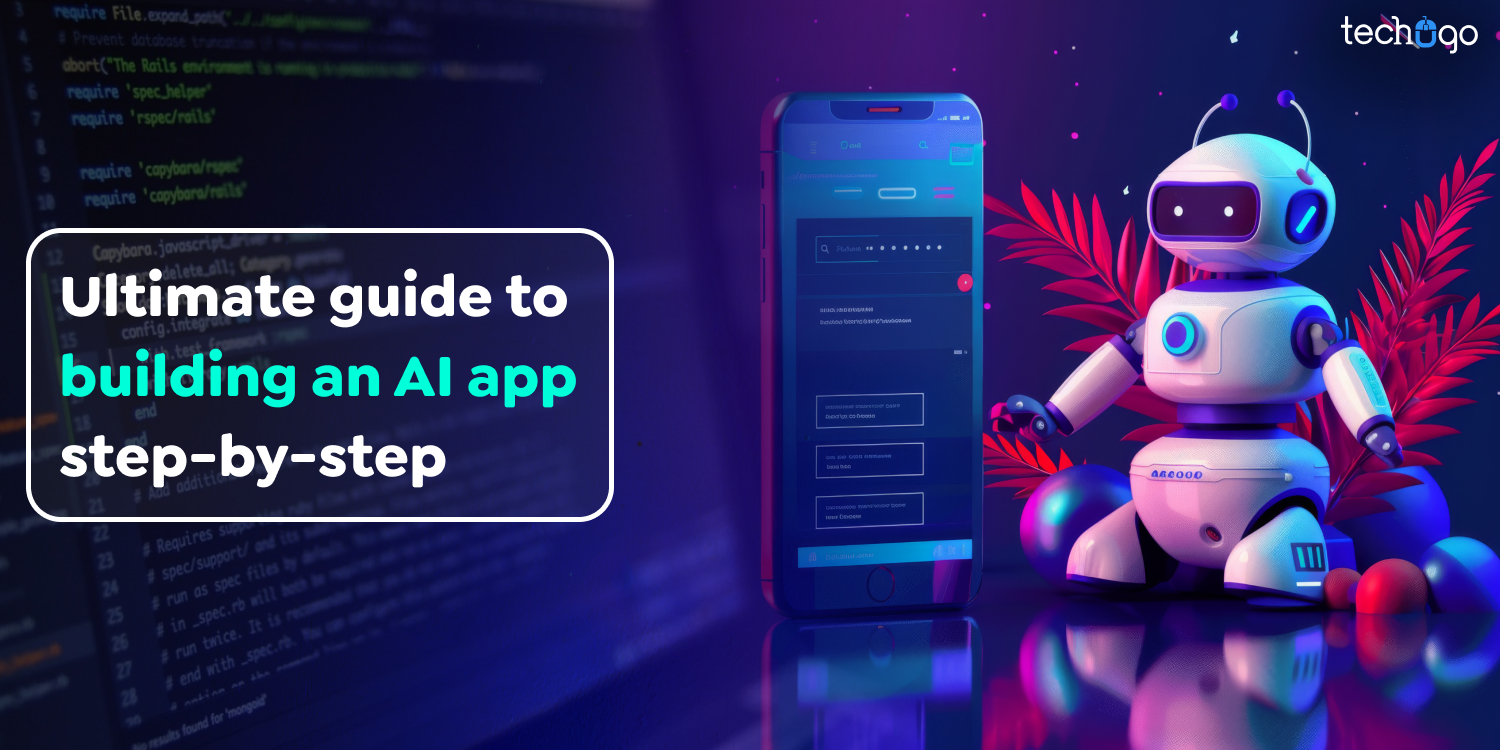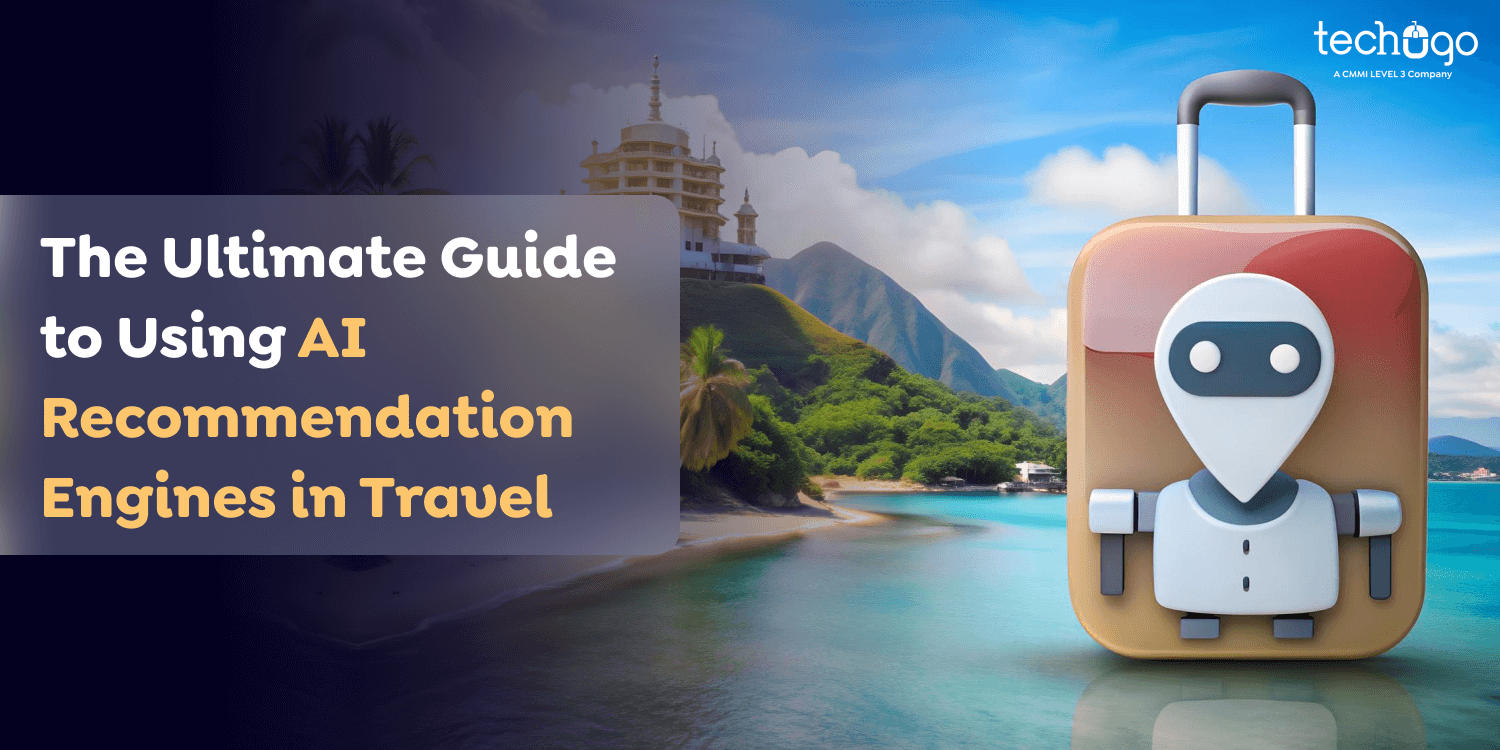1 Aug 2024
How an AI App Development Company Drives Innovation in Mobile Applications
Matthew Connor
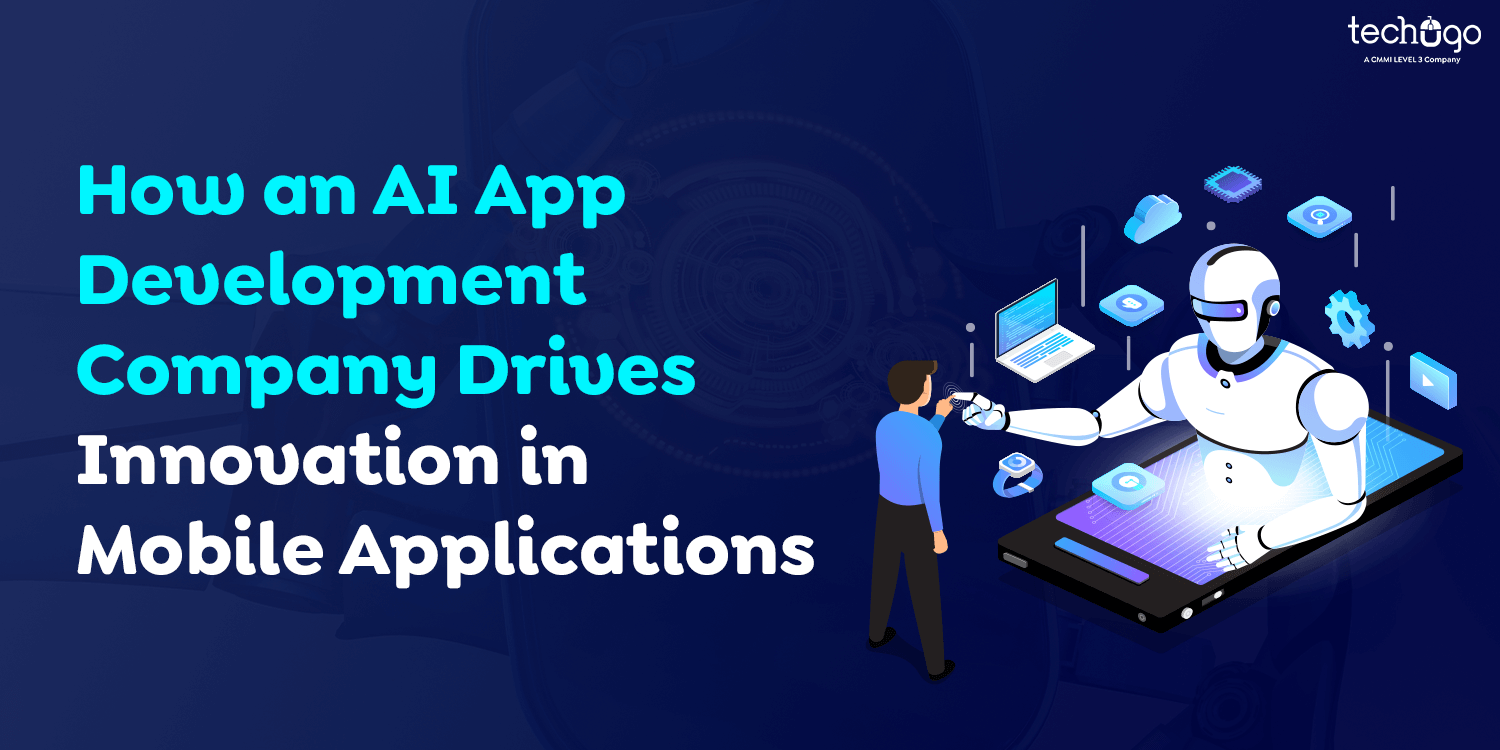
Have you considered how your mobile app can stand out in today’s saturated market with 8.93 million apps?
If you’re hoping to take advantage of mobile applications’ capabilities to lift your company to a higher level choose the right AI app development company. As the technology for smartphones and user experience grows, focusing on the user is becoming increasingly important.
There must be more than just following the popular template and launching your app like this. Today, users’ expectations have risen. They are now looking for customized experiences, quick performance, and various innovative features for mobile applications. Most business owners opt for traditional mobile apps.
However, app developers often need help generating even the necessary business income in the future. This is because their apps need to be unique or have user-centric features. In the end, getting an app to the top ranks is a difficult task on a longer-term basis.
This is where custom mobile app development comes in. Through custom mobile app development, entrepreneurs and startups cannot only expand their target market but also sustain growth over the long term. How?
If you plan to develop an app, we’ll discuss why artificial intelligence is a good option for custom apps. When you finish this article, you’ll discover a wealth of data that will assist you in creating a unique and profitable application.
Let’s dive!
What is Custom App Development?
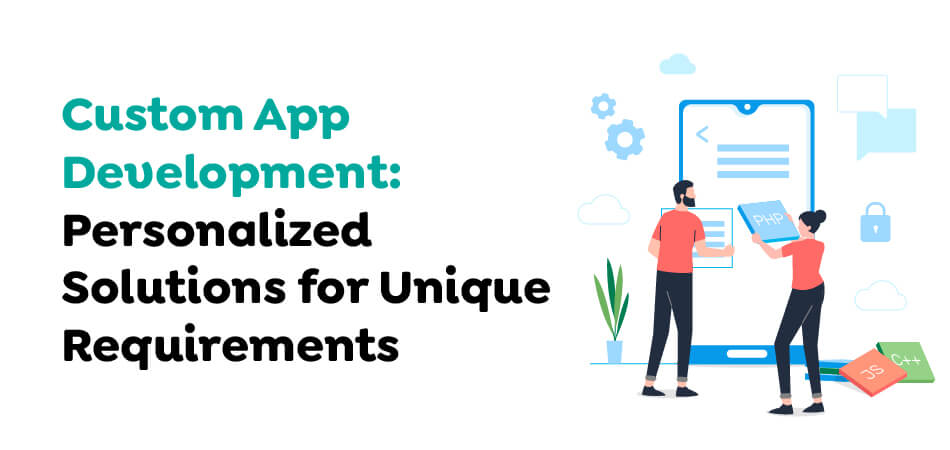
Custom app development involves developing mobile apps tailored to satisfy user requirements. In contrast to pre-built or off-the-shelf solutions designed to meet the needs of a wide range of users, creating a custom app requires the development of an individual and unique mobile app.
This approach to development addresses the specific needs and objectives of a particular segment of users or a specific business area. It enables individuals and businesses to surpass the limitations of conventional applications and create applications that align perfectly with the business owner’s requirements and objectives.
Understand AI Technology
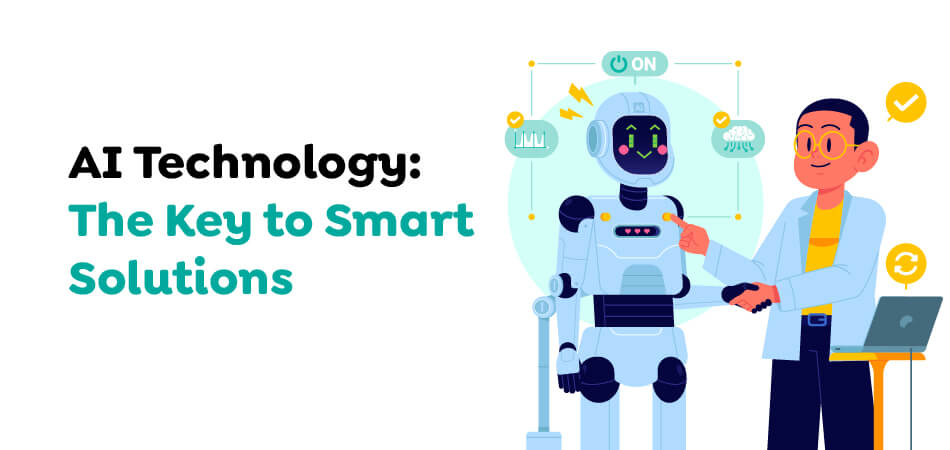
At its heart, AI is a branch of computer science that concentrates on creating intelligent machines that can perform duties that generally require human brains, like solving problems, learning, making decisions, and recognizing patterns. The introduction of AI in the development of mobile apps has opened new development opportunities and has allowed an AI app development company to develop more intelligent, user-friendly, and customized applications.
One of the main reasons for the widespread adoption of AI in the development of mobile apps is the rising need for user-friendly and intelligent applications. With billions of smartphones in use around the world, users are expecting smooth experiences that meet their preferences and requirements. AI algorithms can analyze massive quantities of data, spot patterns, and make educated choices, allowing mobile apps to change based on user behavior and preferences.
Techniques like machine learning, neural technology for natural language processing (NLP), and computer vision have been incorporated into various aspects of mobile app development. AI revolutionizes our interaction with mobile devices, from chatbots to personalized recommendations.
Understanding AI in mobile app development requires comprehending technology behind it, its application, and its possible effects on users and businesses. In the coming segments, we’ll examine the benefits of using AI to develop mobile apps, the benefits in the future, and creative use cases that are changing the game.
Benefits of AI in Mobile Application Development
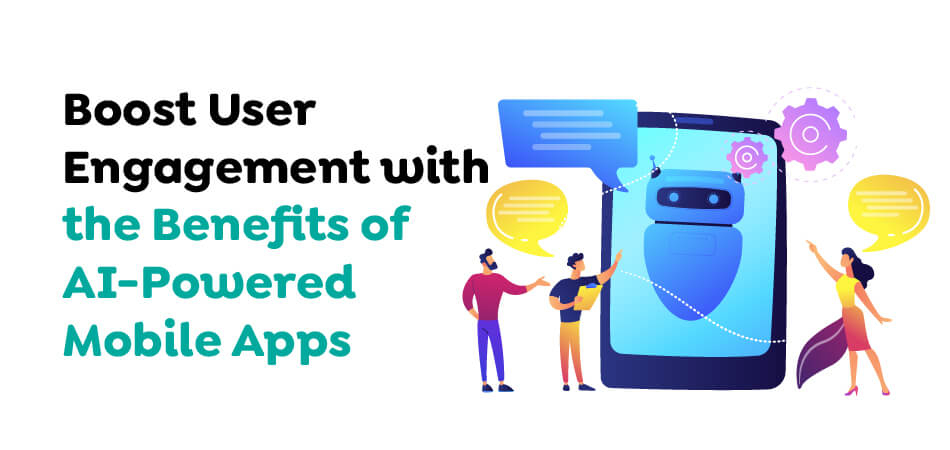
Implementing artificial intelligence (AI) in mobile application development offers many advantages. It has the potential to significantly improve the overall user experience, operational efficiency, and business growth. This section will examine the significant benefits companies and developers can reap by adopting AI to enhance their mobile app development strategies.
Improved User Engagement and Retention
AI-powered mobile apps can provide highly personalized and customized user experiences, increasing retention and engagement rates. AI algorithms can provide customized recommendations, personalized content, and ad-hoc user interfaces tailored to users’ preferences by analyzing the user’s behavior, preferences, and use patterns.
This degree of personalization improves the user experience and creates a deeper relationship between the app’s users and its clients, resulting in higher retention rates and customer loyalty.
Efficient Resource Allocation and Cost Savings
AI can improve resource allocation and speed up processes within mobile applications, leading to substantial cost savings for companies. Machine learning algorithms can diagnose data to identify areas of underutilization or waste, enabling improved resource allocation and utilization. In addition, AI-powered automation may decrease the manual intervention requirement, reducing human error and operational costs.
Intelligent Decision-Making and Predictive Capabilities
AI excels in interpreting large amounts of data, finding patterns, and making educated decisions based on this information. Regarding mobile application design, AI can leverage predictive analytics to anticipate user behavior, market trends, and possible opportunities or issues. This capability to predict trends and opportunities allows companies to make data-driven decisions, proactively tackle problems, and remain ahead of the pack.
Enhanced Security and Privacy
AI is a key element in improving the safety and protection of mobile apps. Machine learning algorithms can detect and block fraudulent activities, detect possible threats, and establish robust authentication methods. AI-powered security tools can be adapted to changing threats, offering another layer of security for sensitive user information.
Scalability and Adaptability
AI-powered mobile apps can quickly grow and adapt to changing user needs and market conditions. Machine learning algorithms can continually learn and adjust to new data inputs, allowing the application to change and grow as time passes. This flexibility and scalability will ensure the mobile application is always up-to-date and relevant, offering an unchanging and seamless service for users.
Improved Accessibility and Inclusivity
AI revolution, such as natural language processing (NLP) and computer vision, can improve accessibility and the quality of mobile applications. NLP lets users communicate with apps using natural language inputs, and computer vision can help with features like image recognition and enhanced reality experiences. With the integration of these AI capabilities, mobile apps have become more accessible to people with various requirements and preferences.
The advantages of AI in developing mobile apps are numerous and extensive. They allow companies to offer top-quality user experiences, increase the efficiency of their operations, and gain an edge in the marketplace. As we progress, we will examine the future trends and developments influencing the use of AI to develop mobile apps, opening new opportunities and propelling the industry to unprecedented levels.
Types of Custom AI App Solutions
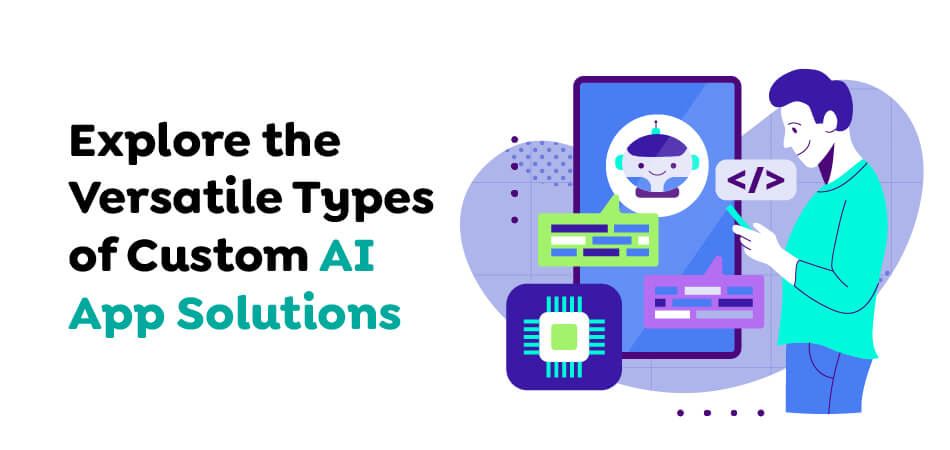
There are many different types of custom AI solutions:
Chatbots and Virtual Assistants
Virtual assistants, on the other hand, are more advanced and can manage schedules and tasks, scheduling reminders and automatizing tasks. Companies can use chatbots to provide adequate customer service, and virtual assistants help streamline internal processes, increasing efficiency and user experience.
Natural Language Processing (NLP) Applications:
NLP applications allow machines to comprehend, interpret, and create human language. Tools for analyzing sentiments can analyze public sentiments on social media platforms, helping businesses understand their customers’ opinions.
Text summarization algorithms compress large documents, making them more easily accessible. Translation services help communicate across different languages, encouraging worldwide connectivity and collaboration.
Computer Vision Applications:
Computer vision allows machines to understand visual data and make decisions based on visual information. Image recognition technology is used for content moderation, ensuring websites are safe and free from harmful content.
Face recognition technology enhances security by confirming identities while tracking and detecting objects, simplifies inventory management, and improves surveillance technology.
Predictive Analytics and Forecasting Applications:
Predictive analytics rely on historical data to forecast future trends. Demand forecasting applications use sales data to improve inventory levels and customer satisfaction and cut expenses; predictive maintenance systems use machine learning to anticipate equipment failure, thus reducing maintenance and downtime. Revenue and sales forecasting models aid businesses in making informed decisions and improving their strategies.
Recommendation System Software:
Recommendation systems look at user preferences and behavior to suggest items or contents. E-commerce platforms make customized product recommendations to increase their customers’ sales and enhance customer engagement.
Media streaming services utilize content recommendations to keep users entertained, increasing their happiness and loyalty. Food and entertainment recommendations based on user preferences enhance the customer experience and increase loyalty.
Data Analysis and Insights Platforms:
AI-driven tools for data analysis assist businesses in extracting valuable insights from huge data sets. These tools detect patterns of trends, patterns, and correlations that allow decision-making based on data.
Fraud detection systems employ sophisticated algorithms to detect suspicious transaction patterns, protecting the financial system. Tools for analyzing customer behavior give businesses valuable insight into the customer’s preferences and habits that can guide products and marketing strategies.
Healthcare Application Solutions:
AI tools in healthcare can improve diagnostics, treatment, and patient outcomes. Disease prediction models analyze the patient’s data to determine possible health risks and allow proactive intervention.
AI-assisted radiology increases the precision of imaging analyses, helping in the early detection of disease. Individualized treatment plans rely on patient medical history and genetic information to customize treatment plans and improve patient outcomes.
Smart Automation and Robotics Implementation:
Robotic process automation (RPA) can automate repetitive jobs, decreasing human errors and increasing efficiency. Autonomous robots with AI algorithms can navigate through environments, completing jobs in warehouses, delivery, and dangerous locations.
AI-powered drones gather and analyze information for applications like agriculture, disaster management, and environmental monitoring, giving meaningful insights and assisting decision-making.
Gaming and Entertainment:
AI-driven characters and NPCs improve gameplay by offering real-time interactions and challenging opponents. Content generation algorithms generate exciting game stories, providing captivating and unique experiences for gamers. Real-time optimization algorithms for strategy enhance gaming environments, providing an even and competitive gaming experience and increasing players’ satisfaction levels.
Cybersecurity Software Solutions:
AI-powered cybersecurity solutions improve a company’s digital security. Anomaly detection systems detect abnormal patterns in network traffic and allow security professionals to detect cyber threats earlier.
Tools for analysis and threat intelligence employ AI algorithms to identify potential vulnerabilities and risks and guide the security of your network to take proactive measures. Biometrics based on behavior, like the patterns of typing and mouse movements, can improve user authentication, providing another layer of protection.
Language and Speech Recognition:
Speech-to-text software converts spoken to written language, helping with transcription and making information accessible. Voice assistants like Siri and Alexa employ NLP to comprehend and respond to user commands, allowing hands-free device operation. Language learning apps utilize pronunciation analysis to give students feedback, improving their language acquisition and fluency.
Environmental Monitoring:
AI applications developed by an AI app development company play an essential function in monitoring the environment and conservation initiatives. Climate and prediction models use AI algorithms to analyze vast amounts of data. They aid scientists in studying patterns of climate and forecasting environmental changes.
Applications for ecological sensor data analysis take data from sensors, revealing information on pollution levels and the quality of the environment. Wildlife monitoring applications use sensors and cameras that AI powers to monitor and safeguard endangered species, assisting conservation efforts.
How To Make a Custom AI Application
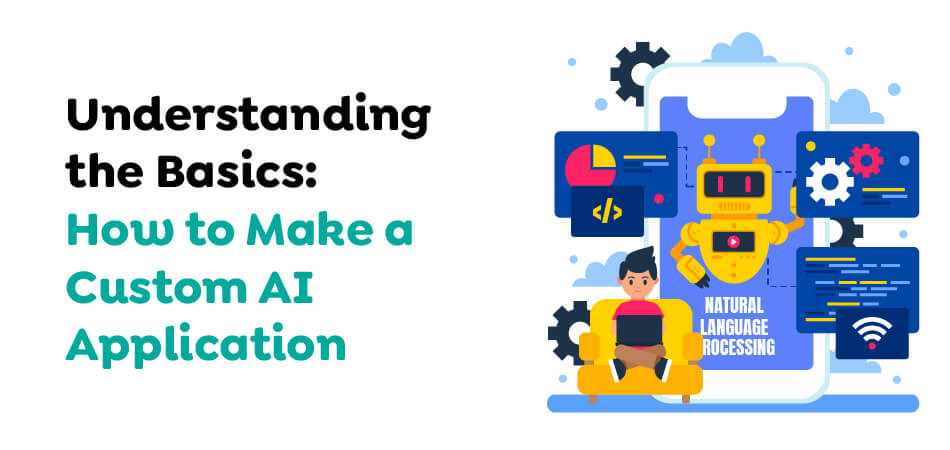
Making a Custom AI Application is now a possibility and a powerful tool for entrepreneurs and innovators. Whether trying to change customer interaction or simplify processes, creating a custom AI application requires creative thinking, meticulous planning, and a thorough understanding of your goals. This guide will help you comprehend the complex steps needed to conceptualize the idea and develop and implement your unique AI marvel tailored to your needs.
Define Your Purpose
Start with crystal-clear vision. Set out the problem your AI app is designed to solve and the benefit it can provide users. Whether it’s improving the user experience, automating tasks, or predicting market trends, having a clearly defined objective is the basis of your app.
Data, the Fuel for AI
Gather and organize high-quality data. Your AI system’s accuracy and effectiveness heavily depend on the data it’s based on. Collect relevant, diverse, and extensive datasets to strengthen the AI model. Remember that how well your information is processed directly affects the efficiency of your application.
Choose the Right Technology
Choose the right AI tools and platforms, selecting machine learning libraries like TensorFlow and PyTorch based on your project’s requirements. Look into natural language processing software, computer vision APIs, and other specific AI technologies compatible with your objectives.
Development and Training
This stage involves developing a fundamental algorithm and model—partnering with a skilled AI app development company that can efficiently create and train the models. Machine learning algorithms require intense training and fine-tuning to guarantee the best performance.
User Interface and Experience
Create a user-friendly interface (UI) and a seamless user experience (UX) with the help of an AI app development company. Whatever the AI algorithms may be, people must interact through the user interface. Focus on accessibility, simplicity, and ease of use. Build an interface that helps users navigate the app’s features.
Testing and Iteration
A thorough testing process is essential. Conduct thorough testing to find issues, bugs, or areas for improvement. Based on user feedback and test results, develop a new version. Continuous improvement is essential to creating a reliable and user-friendly AI program.
Scalability and Security
Consider scalability and security right from the beginning. Your app must be able to handle increased user load without affecting performance. Use solid security measures to safeguard user data, ensuring confidentiality and integrity.
Deployment and Maintenance
Once your app has been perfected and refined, you can deploy it on the platforms you intend to use. Be aware of its performance post-launch and take proactive steps to address any issues. Regular updates, maintenance, and improvements ensure your AI app is competitive and relevant.
If you follow these steps and adopt the idea of continual learning, adapting, and bringing your own AI vision to reality, you will have a profound impact on your business and customers’ daily lives.
Future Trends and Innovations in AI for Mobile App Development
Artificial Intelligence (AI) in app development is rapidly evolving. The upcoming years hold promising developments and trends that will revolutionize how we interact with and utilize mobile apps. As AI technology continues to improve, breakthrough innovations that will redefine possibilities within developing mobile apps are possible. In this chapter, we will examine the most cutting-edge technologies and breakthrough developments that are set to transform the field of AI and mobile app development.
Conversational AI and Advanced Natural Language Processing (NLP)
Conversational AI and the latest NLP capabilities will transform how users interact with mobile applications. Consequently, AI-powered chatbots and virtual assistants will become sophisticated and, in turn, capable of comprehending and responding to complicated natural language queries using context awareness. Moreover, intelligent chatbots can engage in multi-turn conversations, maintain context, and provide appropriate and relevant responses, thereby replicating human-like conversations.
Furthermore, advances in NLP will allow mobile apps to comprehend the language and translate it into more complex ways, allowing for regional dialects, slang, and other ambiguities. This will allow for more natural and seamless voice-based interaction, making mobile apps available to more users, including those with disabilities or barriers to speaking.
Edge AI and On-Device Processing
Edge AI, which refers to data processing and implementing AI models on mobile devices, is gaining momentum. Specifically, this method reduces the need for continual cloud connectivity and improves security and privacy by storing sensitive information on the device. Moreover, as mobile devices become more efficient and energy-efficient, processing on the device that utilizes AI models will provide real-time analytics, faster responses, and better performance for mobile apps powered by AI.
Edge AI will be especially useful for applications that require low latency, such as AR (AR) experiences, real-time object recognition, or voice assistants. These apps can provide smooth and fast experiences without continuous internet connectivity or cloud-based communication by processing data locally.
Explainable AI and Trustworthy Decision-Making
As AI systems grow more complex and influence decision-making processes, there is a rising demand for an explanation of AI (XAI). Consequently, XAI seeks to create AI models that are understandable and transparent, allowing users to comprehend the reason behind the decisions made by AI systems. This is vital in establishing trust and ensuring the ethical and responsible usage of AI in mobile app development.
Moreover, XAI methods, such as models’ interpretability and counterfactual explanations, can enable mobile applications to present clear and easily understood explanations for the predictions, recommendations, or choices made by AI models. This transparency not only helps build user confidence but also aids in auditing and debugging processes, ensuring that AI systems operate within ethical and legal boundaries.
Generative AI and Content Creation
Generative AI models, including large language models and generative adversarial networks (GANs), are poised to transform the content creation process for mobile applications. Moreover, these models produce realistic text, images, audio, and code, thereby allowing an AI app development company to create engaging and rich content more efficiently. Generative AI can also facilitate customized content creation tailored to users’ preferences and contextual needs.
For example, language models such as GPT-3 can create human-like text to describe products, narratives, or interactive narratives inside mobile applications. GANs, however, can create realistic graphics and images that open the door to new possibilities for creating immersive virtual worlds, digital avatars, and customized visual content.
Federated Learning and Collaborative AI
Federated learning is a promising method that allows AI algorithms to train using distributed data sources like mobile phones while protecting the user’s privacy.
This technique allows for collaboration in AI development, wherein devices can contribute to the training process without sharing data in raw form. Consequently, federated learning can be instrumental in developing AI models that adapt to different user groups and settings, thereby improving the efficiency and effectiveness of mobile applications built by an AI app development company.
Through federated learning, a mobile app development company in Toronto can develop AI algorithms that can be adapted to particular geographic regions or user groups, taking into consideration local dialects, cultural nuances, and user behavior.
This distributed AI training model not only protects users’ privacy but also allows for constant learning and development when more data becomes accessible from various sources.
Augmented Reality (AR) and Computer Vision
Combining AR (AR), computer vision technology, and AI opens up new possibilities in immersive mobile experiences. AI-powered computer vision could provide:
- Live object detection.
- Understanding of scenes and overlays of augmented reality.
- Engaging and contextually aware applications span various fields, including retail, gaming, education, and navigation.
For instance, in mobile retail applications, AI-powered computer vision may allow virtual trial experiences that enable customers to see how items, like cosmetics or clothing, appear before making a purchase. Similarly, in games, AI-powered AR can help create dynamic and interactive environments that react to the natural environment, enhancing the overall gaming experience.
Moreover, this combination of AI and computer vision could make mobile apps able to understand and interpret complicated visual images, which opens up possibilities for applications in the fields of health care (medical image analysis), mobility (autonomous vehicles), and security (surveillance and monitoring).
The upcoming trends and developments regarding AI in developing mobile apps are expected to change the way we think about mobile apps. In the years to come, as AI continues to grow and mature, a custom mobile app development company that adopts these cutting-edge technologies will, consequently, benefit from a substantial competitive advantage by providing better user experiences and, furthermore, fostering innovation in the mobile app industry. Indeed, there are endless possibilities in the future for AI in mobile app development, which is expected to be a fascinating and fast-changing field.
Conclusion
Incorporating AI app development holds enormous potential to transform app functionality and user experience. In our future mobile apps, it is evident that integrating artificial intelligence (AI) with customized Android app development isn’t only a trend but an era-changing change that is changing how we view and interact with mobile technology. At Techugo, an AI app development company, we’re committed to being at the forefront of this revolution, continually investigating new ways to utilize AI to improve the functionality of apps, personalize user experience, and simplify operations.
As we progress with our efforts, we remain focused on making the most of AI to develop Android apps that are both technologically advanced but also ethical and user-centric.
We encourage our customers, partners, and all those in the technology industry to take advantage of the possibilities offered by AI and, consequently, continue to develop and push towards the future of app development. Together, we’re setting new standards for the industry and, furthermore, developing apps that are more intelligent, more responsive, faster, and more in tune with the demands of users all over the world.
Get in touch with Techugo to build your custom AI app.
Get In touch
We are excited to here from you and let’s start something special Together. Call Us for any inquiry.
Write us
sales@techugo.caJust a call away
About you

